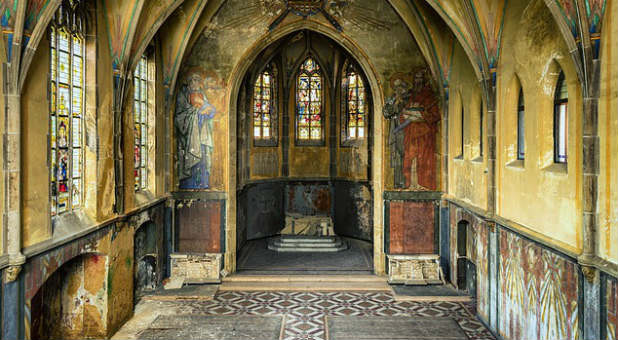
It's not a pleasant topic.
But if we don't talk about dying churches, we will act like there are no problems. As I wrote in Breakout Churches, the first stage for any church to reverse negative trends is awareness or, stated another way, confronting the brutal realities. Somewhere between 7,000 and 10,000 churches in America will close their doors in the next year. And many of them die because they refuse to recognize problems before they became irreversible. So, it is with both sorrow and great love for local churches that I share a pattern that is increasingly common. I call it "the six stages of a dying church."
1. Denial. The church is declining numerically, but no one seems concerned. Fewer people are reached with the gospel, but no alarm sounds. The church's impact on the community is negligible, but life continues in the church like nothing has happened.
2. Recalibration. There is a sense that something's wrong in the church, so the church responds in one of two ways. Do more of what we are doing that has proven ineffective. Or, secondly, seek a "magic bullet" program, emphasis or new pastor. The church does not really want to change; it just thinks it needs an adjustment.
3. Anger. Church leaders and members begin to recognize that the magic bullet did not reverse the negative trends, so they deflect the blame. It's the denomination's fault. It's those young people who don't respect the way we've always done it. It's the messed-up culture. It's the people in our community who stopped attending churches. The anger in these churches is palpable.
4. Exodus. The church had been losing members gradually to this point, but now the outflow increases. And even those who don't officially leave attend less frequently. The worship center is desolate on Sunday mornings. The anger in the church moves to demoralization.
5. Desperation. For the first time since the dying process began, the remaining members say they are more open to new ideas and change. But their words are more words of desperation than conviction. They now see the handwriting on the wall. Their church will soon die.
6. Death. The church becomes another sad and tragic statistic. At best, the church deeds its property to a healthy church. The process from denial to death in the recent past would take as many as thirty years. Today, the process is much shorter, 10 years or fewer.
Churches have broken free from the death stages, but they are rare. And the longer the church waits to make substantive changes, the more difficult it becomes to reverse the path. It's significantly easier to make changes at Stage 1 than Stage 4. Also, keep in mind that nearly 9 out of 10 of the churches that die are in communities that are growing. The problem is not a shortage of people. The problem is a shortage of courage, commitment and sacrifice. ![]()
Thom S. Rainer is the president of LifeWay Christian Resources.
This article originally appeared at thomrainer.com.
Get Spirit-filled content delivered right to your inbox! Click here to subscribe to our newsletter.
Dr. Steve Greene is now sharing stories, teachings, and conversations with guests who lead with love on Love Leads, a new podcast. Listen now.
Dr. Mark Rutland's
National Institute of Christian Leadership (NICL)
The NICL is one of the top leadership training programs in the U.S. taught by Dr. Mark Rutland. If you're the type of leader that likes to have total control over every aspect of your ministry and your future success, the NICL is right for you!
FREE NICL MINI-COURSE - Enroll for 3-hours of training from Dr. Rutland's full leadership course. Experience the NICL and decide if this training is right for you and your team.
Do you feel stuck? Do you feel like you’re not growing? Do you need help from an expert in leadership? There is no other leadership training like the NICL. Gain the leadership skills and confidence you need to lead your church, business or ministry. Get ready to accomplish all of your God-given dreams. CLICK HERE for NICL training dates and details.The NICL Online is an option for any leader with time or schedule constraints. It's also for leaders who want to expedite their training to receive advanced standing for Master Level credit hours. Work through Dr. Rutland's full training from the comfort of your home or ministry at your pace. Learn more about NICL Online. Learn more about NICL Online.


